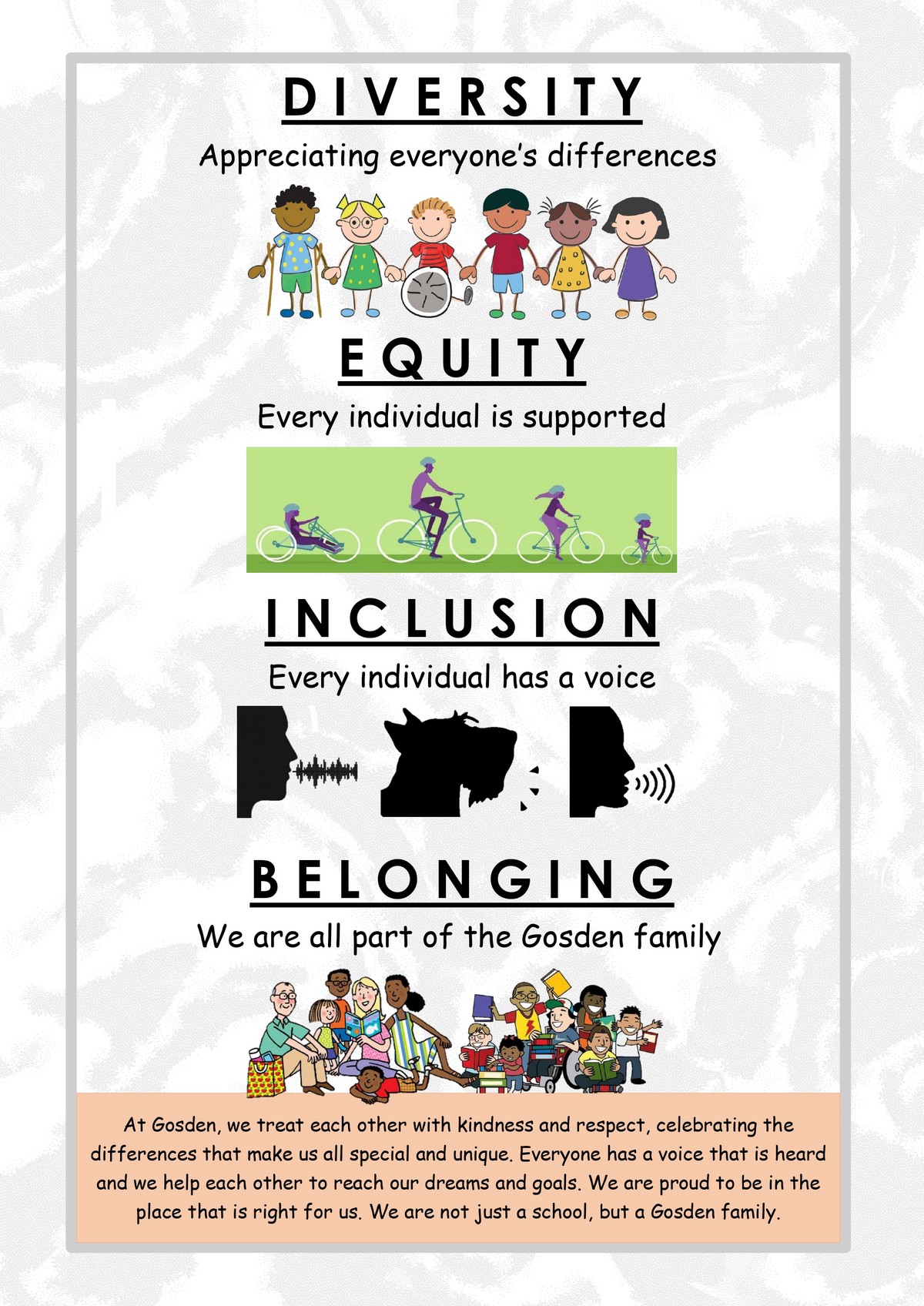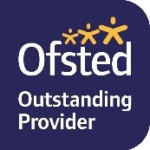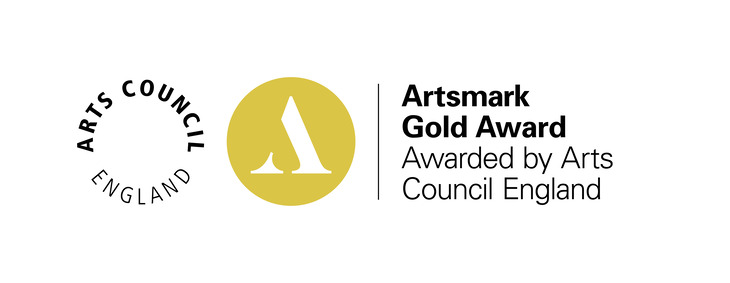Aims & Vision
- A reflective and supportive community, committed to enquiry into opportunities and strategies to further our knowledge and understanding of our young people in order that we may challenge expectations and raise outcomes.
- A collaborative team with high expectations of ourselves, our youngsters and all those with whom we engage.
- A community that respects and values the dignity of each individual, celebrating difference and nurturing the development of the whole person.
- An outward-looking organisation, focused on promoting a positive image of our young people as part of, and as active participants in, their own and the wider community.
- A flexible, adaptive and creative community prioritizing personalised learning that is meaningful, relevant, stimulating and fun.
The Gosden Ethos
At Gosden House School, we recognise each child and young person's unique experience. We seek to understand the motives, wishes and feelings behind behaviour, because we believe all behaviour is communication. We aim to nurture connection, build healthy relationships and promote resilience to achieve success in the present and hope for the future.
Personal and Social Development at Gosden
British Values, Diverity, Equity, Inclusion and Belonging
Our Gosden Values
We actively promote British Values at Gosden House and through our ‘Toolkit’ curriculum we aim to prepare and develop the key ‘life tools’ our Gosden Graduates need for life in modern Britain. Our pupils are encouraged to regard people of all faiths, races and cultures with respect, curiosity and acceptance. These values are at the core of all we do whether it be through our assemblies, our RE curriculum, our PSHE, and citizenship lessons or through other areas of the curriculum. The term British values can be somewhat misleading as these values are integral to so many countries across the world and we see these as core ‘Gosden Values’
The Key Values are:
- Democracy
- Rule of Law
- Individual Liberty
- Mutual Respect
- Tolerance of those of different faiths and beliefs
Below are some examples of how British values are promoted in our school curriculum:
Democracy – ‘We make decisions together’
We learn about and promote DEMOCRACY through electing an active school council each year, following democratic processes. The school council is very proactive in having its voice heard and meet fortnightly. Students are involved in shaping the curriculum, we vote for our Yearly Daybook Design competition and come up with our class rules. We take part in pupil, parents/ carers questionnaires. Democracy is embedded in our learning community and students are always listened to by adults and are taught to listen carefully and with concern for each other, respecting the right of every individual to have their opinions and voice heard. Pupils are encouraged to make decisions about the direction of their learning and what they individually need to build their ‘Learning Power’. In addition, the school organises charity work throughout the year. This includes fun days such as wearing odd socks for ‘Anti-Bullying’ week or yellow as part of World Mental Health Day or holding bake sales as well as our support of the local foodbank and nursing homes. This fostering of a commitment to charities is another way in which we teach a sense of Britishness.
The Rule of Law – ‘We understand why rules are important.’
We learn about and promote THE RULE OF LAW through our school Relational Support policy, lessons and school assemblies. Literacy and Morals lessons provide opportunities for debating and learning how to argue/defend our different ideas and views. Students are taught from an early age the rules of the school. Students are taught the value and reasons behind rules and laws in that they govern and protect us, the responsibilities that this involves and the consequences when laws are broken
We have visits from authorities such as the Police and Fire Service. Each class also discusses and sets its own rules and they help us to learn in safe, creative and collaborative learning spaces.
Individual Liberty – ‘We are free to make choices’
We learn about and promote INDIVIDUAL LIBERTY through our responsibilities as lunchtime and classroom helpers, reading buddies and playground helpers, We have lots of different lunchtime enrichment activities that we can choose from and our KS4 Exam Options. PSHE and RSE lessons help us to understand how to keep safe. In and out of lessons we learn about bullying and how to build positive relationships. At Gosden, we are actively encouraged to make choices within our learning, knowing that we are in a safe and supportive environment.
Tolerance– ‘We enjoy learning about different faiths, beliefs and cultures.’
We learn about and promote TOLERANCE through school assemblies, visits to places of worship, RE lessons, our yearly Diversity Week, visitors in school, displays around the school, our PSHE curriculum, our Citizenship Curriculum, our weekly Social Skills lessons and Whole School Bucket Filling. In our school community each person is respected and valued equally without regard to ability, gender, faith, heritage and our differences are celebrated in many ways including, our ‘It’s Ok to be different’ secondary poster project.
The school’s RE curriculum is based on the Surrey Agreed Syllabus formulated by SACRE (Standing Advisory Council on Religious Education) which is made up of members of Christian denominations other than the Church of England and other faith groups representing the main religions traditions of the area.
Mutual Respect – ‘We treat others how we would like to be treated.’
We learn about and promote MUTUAL RESPECT through our school code of conduct, whole school focus weeks, charity fund raising events, participating in local community events, PSHE and RSE curriculum, Whole School Bucket Filling and our School Prayer. As a school, we take part in sporting activities which helps to instill ‘fair play’ and engender a ’team spirit’. All members of our community treat each other with respect and this is echoed through our teaching and learning environments and modelled at all times by our staff.
We pride ourselves in the way that our students support and encourage one another, showing an understanding and empathy of one other’s different needs and levels.
PREVENTING RADICALISATION AND EXTREMISM
Radicalisation is defined as the act or process of making a person more radical or favouring of extreme or fundamental changes in political, economic or social conditions, institutions or habits of the mind.
Extremism is defined as the holding of extreme political or religious views.
The Governing Body of Gosden House School has a zero tolerance approach to extremist behaviour for all school community members. We rely on our strong shared values to steer our curriculum and ensure the pastoral care of our students protects them from exposure to negative influences and exploitation.
Gosden House is fully committed to safeguarding and promoting the welfare of all its learners. As a school we recognise that safeguarding against radicalisation is no different from safeguarding against any other vulnerability. At Gosden House all staff are expected to uphold and promote the fundamental principles of British values, including democracy, the rule of law, individual liberty and mutual respect and tolerance of those with different faiths and beliefs.
Although incidents involving radicalisation have not occurred at Gosden House to date, it is important for us to be constantly vigilant and remain fully informed. All teaching staff have completed Prevent Awareness Training. Our students are very vulnerable and are at great risk of being exploited. Staff are reminded to suspend any professional disbelief that instances of radicalisation ‘could not happen here’ and to refer any concerns to the Safeguarding Team.
Diversity, Equity, Inclusion and Belonging at Gosden
We feel passionately about our responsibility to eliminate discrimination, promote equality or opportunity and foster positive relationships between people of all background. This duty is set out in the Equality act of 2012 which covers sex, race, disability, religion and belief, sexual orientation and gender reassignment. All curriculum areas help to provide a vehicle for further understanding these protective characteristics as defined in law.
Our DEIB (Diversity, Equity, Inclusion and Belonging) values are interwoven into all curriculum areas.
At Gosden, we treat each other with kindness and respect, celebrating differences that make us all special and unique. Everyone has a voice that is heard and we help each other to reach our dreams and goals. We are proud to be in the place that is right for us. We are not just a school, but a Gosden Family.
What ‘Diversity’ means to us… Appreciating everyone’s differences
What ‘Equity’ means to us… Every individual is supported
What ‘Inclusion’ means to us… Every individual has a voice
What ‘Belonging’ means to us… We are all part of the Gosden Family

How we aim to provide ‘Cultural Capital’ in our learners.
Our curriculum is born of our desire to prepare every pupil to be a confident Gosden Graduate, who will succeed in the workplace and live rewarding, independent lives.
Through the ‘cultural’ coverage in our ‘Toolkit Curriculum’ pupils learn about the world, people’s beliefs, The Arts and current events. This also links to our DEIB focus which is woven into our overall intent for each of our curriculum areas.
We also ensure that our learners have cultural experiences that help them to better understand their world and prepare them to be successful Gosden Graduates. These experiences include day trips, residential experience, outdoor learning, visiting places in our local community including places of worship, shops, libraries, museums and Art Spaces. We also hold yearly ‘Gosden Values’ week where we celebrate our differences linked to the protected characteristics.
One of our Key Life tools developed through our curriculum is to build a ‘Sense of Belonging’ in all our learners.
Sense of Belonging – Identified End Point
 “I have the skills to be confident in my community and feel valued in making positive contributions. I am interested in the world outside my door and I want to play a part in it, understanding differences in people and my community.”
“I have the skills to be confident in my community and feel valued in making positive contributions. I am interested in the world outside my door and I want to play a part in it, understanding differences in people and my community.”



